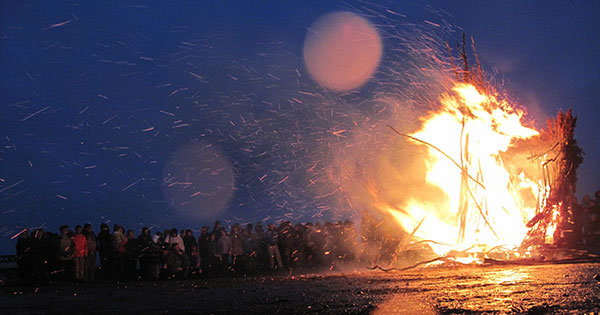
“Prepare for opportunity disguised as loss,” a note scrawled in black marker on a scrap of white paper said. The adage was wedged into a 10-foot-tall basket made of materials found in local meadows and woods. Each fall, for the past 12 years, a Homer artist named Mavis Muller has been creating a piece of impermanent art—in the guise of a large basket—at the edge of the beach at Mariner Park and then burning it in a massive bonfire at dusk.
A strong westerly snapped sheets of cold, sideways rain at us as I examined the basket, trying to keep one eye on my daughters in the crowd. Hundreds of people milled around in hats, raincoats, and boots in the draining light. “Prepare for opportunity disguised as loss.” The note stopped me for a moment and reminded me of the first time I had seen the basket a few years ago. After years of passing off the autumn event as a strange hippie ritual that didn’t fit well with my practical sensibilities, I had gone to see the structure the morning before the burn. Made of spruce boughs, alder branches, and twisted grasses and wildflower stalks, the basket had scores of handwritten notes woven into it. Dried flowers and shells had been wedged in here and there.
As rain wetted the oversized raincoat I wore over a down jacket, I circled the structure. Other notes said the names of the departed: Frank Mullen, a local set netter and environmental activist who had died of cancer over the summer; Gale Parsons, a soft-spoken woman who had worked at the local museum, gone now half a dozen years. Each year, a woman delivers 100 origami cranes during construction of the basket for people to incorporate into the structure. Her elderly mother bakes cookies for the basket volunteers. Some cranes bore names of the dead I couldn’t identify: Andrew, Karen, Jack. On one, a story I could only imagine: “grandma, mom, the farm.” The intense beauty of the basket and the way you could see the marks of so many different people’s attention made my eyes fill with tears and formed a tight knot in my throat.
As with every event in our small town, everywhere we looked we saw people we knew: my daughter’s kindergarten teacher, a water taxi operator and his family, the owner of the daycare both my kids have attended, the city manager’s husband, the chairman of the volunteer parks and recreation commission, owner of one of the largest contracting companies in town.
A rope made a perimeter about 25 feet from the basket. As it got dark, everyone found a spot along the ring. While drummers provided a kind of heartbeat in the crowd, four people with torches set the basket on fire. In the rain, the initial lighting gave way only to an intense rush of smoke that broke the circle of people as they scrambled out of its path.
As the center of the structure caught fire, smoke gave way to flames that shot high against the indigo sky. The strong wind coming from the mouth of the bay sent sparks flying far across the parking lot. They looked alternately like snowflakes and meteorites. As the blaze grew, it set off fireworks buried deep in the basket that sizzled into the night.
Two days before, a vandal had tried to ignite the basket. Volunteers stepped forward to be security—sleeping next to the basket in their vehicles. But in the pre-dawn hours, the vandal quietly returned and attached a chain to the basket’s legs and dragged it off with a truck. The basket broke apart in a nearby ditch. By daylight, people showed up in droves to rebuild it in time for the burning that evening.
Muller says she doesn’t care what meaning people take from the event. “It’s none of my business,” she said. She stood at the perimeter like everyone else, as flames glowed orange on her face and on the hundreds of other faces ringed around the basket. Light and smoke shot skyward while the bones of the structure fell to the ground. A week later, when an 18-year-old high school student confessed that he’d been the one to try to sabotage the event, the saying about loss and opportunity became a slogan for the whole event.
The burning of the basket felt to me, because I have no other, like church. It felt like a way of marking the ending of one thing and the beginning of the other, a way of finding warmth and light as the Earth’s orbit tips us once again into the dark.


